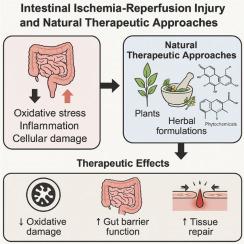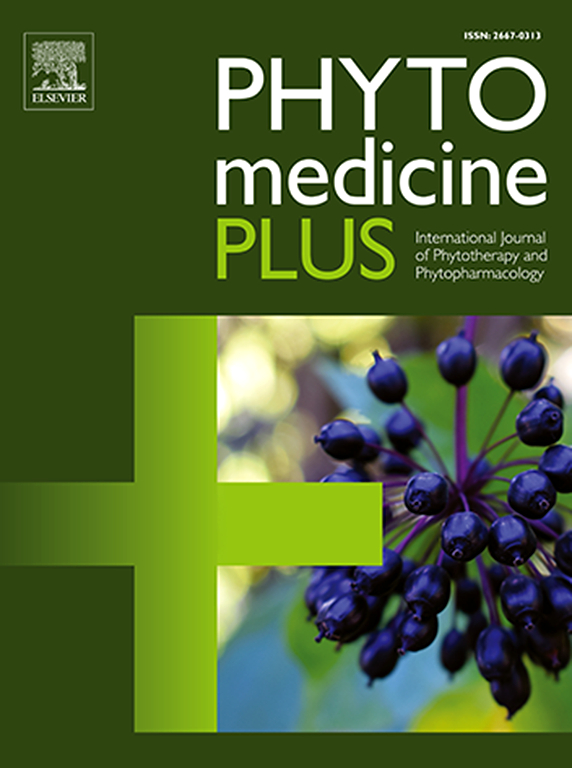Natural compounds targeting inflammation and oxidative stress in intestinal ischemia-reperfusion injury: a comprehensive review
Q3 Pharmacology, Toxicology and Pharmaceutics
引用次数: 0
Abstract
Background
Intestinal ischemia-reperfusion (I/R) injury is a severe condition characterized by significant morbidity and mortality, caused by the temporary disruption of blood supply to the intestines followed by reperfusion. This pathological process induces oxidative stress, inflammation, and cellular damage, which collectively impair intestinal function. Recent studies have explored natural therapeutic approaches, including the use of plants, herbal formulations, and phytochemicals, to mitigate the detrimental effects of intestinal I/R injury. Numerous plant-derived compounds, such as flavonoids, alkaloids, and terpenoids, exhibit antioxidant, anti-inflammatory, and cytoprotective properties, offering potential to modulate the underlying pathophysiological mechanisms.
Purpose
This review aims to consolidate current knowledge regarding the therapeutic potential of plants and their bioactive constituents in managing intestinal I/R injury. It also seeks to identify promising phytochemicals and plant-derived formulations that can alleviate oxidative damage, support gut barrier integrity, and promote tissue repair. The objective is to provide a comprehensive analysis of the mechanistic pathways targeted by these natural compounds and to highlight areas requiring further research for optimizing clinical applications.
Method
The review systematically compiled data from clinical trials, systematic reviews, meta-analyses, and recent peer-reviewed studies published over the past decade. The search was conducted using four major databases: PubMed, Scopus, Web of Science, and Google Scholar, with key terms including "phytochemicals," "intestinal I/R injury," "herbal formulations," and "bioactive compounds." Studies were selected based on their focus on the therapeutic effects of phytochemicals on intestinal I/R injury, particularly those addressing oxidative stress, inflammation, and intestinal barrier disruption. The data were categorized according to phytochemical classes, mechanisms of action, and therapeutic outcomes.
Results
Phytochemicals such as flavonoids, polyphenols, and alkaloids exhibit potent antioxidant and anti-inflammatory effects. These compounds reduce reactive oxygen species (ROS) levels, inhibit NF-κB activation, and regulate cytokine release, thereby mitigating inflammatory responses. Herbal decoctions, particularly those rich in bioactive compounds and polysaccharides, have demonstrated efficacy in maintaining intestinal integrity, protecting tight junction proteins, minimizing bacterial translocation, and preventing endotoxemia. Additionally, these natural formulations have shown potential in minimizing tissue damage, promoting gut repair, and reducing the risk of systemic complications, including sepsis and multiple organ dysfunction syndrome (MODS).
Conclusion
Phytochemicals, herbal extracts and herbal decoctions offer promising complementary therapeutic options for managing intestinal I/R injury. Through their multi-targeted effects on oxidative stress, inflammation, and intestinal barrier integrity, these natural compounds can significantly reduce tissue damage and support recovery. Further research is essential to elucidate their precise mechanisms of action and to establish their efficacy in clinical settings, paving the way for integrating herbal-based interventions into I/R injury management strategies.

肠道缺血再灌注损伤中靶向炎症和氧化应激的天然化合物综述
肠缺血再灌注(I/R)损伤是一种严重的疾病,其特点是发病率和死亡率很高,是由肠道血液供应暂时中断引起的再灌注损伤。这一病理过程诱导氧化应激、炎症和细胞损伤,共同损害肠道功能。最近的研究探索了自然治疗方法,包括使用植物、草药配方和植物化学物质,以减轻肠道I/R损伤的有害影响。许多植物衍生的化合物,如黄酮类化合物、生物碱和萜类化合物,具有抗氧化、抗炎和细胞保护特性,具有调节潜在病理生理机制的潜力。目的本综述旨在巩固目前关于植物及其生物活性成分在肠I/R损伤治疗潜力的知识。它还寻求确定有前途的植物化学物质和植物衍生配方,可以减轻氧化损伤,支持肠道屏障完整性,促进组织修复。目的是对这些天然化合物靶向的机制途径进行全面分析,并突出需要进一步研究的领域,以优化临床应用。方法本综述系统地汇编了来自临床试验、系统评价、荟萃分析和最近发表的同行评议研究的数据。检索使用了四个主要数据库:PubMed、Scopus、Web of Science和谷歌Scholar,关键词包括“植物化学物质”、“肠道I/R损伤”、“草药配方”和“生物活性化合物”。研究的选择基于植物化学物质对肠道I/R损伤的治疗作用,特别是那些处理氧化应激、炎症和肠屏障破坏的研究。数据根据植物化学分类、作用机制和治疗结果进行分类。结果黄酮类、多酚类和生物碱等植物化学物质具有较强的抗氧化和抗炎作用。这些化合物可降低活性氧(ROS)水平,抑制NF-κB活化,调节细胞因子释放,从而减轻炎症反应。草药煎剂,特别是那些富含生物活性化合物和多糖的煎剂,已被证明具有维持肠道完整性、保护紧密连接蛋白、减少细菌易位和预防内毒素血症的功效。此外,这些天然配方在最大限度地减少组织损伤、促进肠道修复和降低全身并发症(包括败血症和多器官功能障碍综合征(MODS))的风险方面显示出潜力。结论植物化学制剂、中药提取物和中药煎剂是治疗肠I/R损伤的有效补充治疗方法。通过对氧化应激、炎症和肠道屏障完整性的多靶点作用,这些天然化合物可以显著减少组织损伤并支持恢复。进一步的研究对于阐明其确切的作用机制和确定其在临床环境中的疗效至关重要,从而为将草药干预纳入I/R损伤管理策略铺平道路。
本文章由计算机程序翻译,如有差异,请以英文原文为准。
求助全文
约1分钟内获得全文
求助全文
来源期刊

Phytomedicine Plus
Medicine-Complementary and Alternative Medicine
CiteScore
3.70
自引率
0.00%
发文量
178
审稿时长
81 days
期刊介绍:
 求助内容:
求助内容: 应助结果提醒方式:
应助结果提醒方式:


